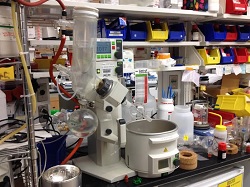 |
| Robert Langer |
BOSTON--Master scientist and entrepreneur Robert Langer offered his thoughts on those topics and their relationship to drug delivery to FierceDrugDelivery in his MIT office and later to the field at large at the Partnership Opportunities in Drug Delivery conference in Boston.
Langer Lab startups presenting at the conference include BIND Therapeutics and Kala Pharmaceuticals.
"I'm not sure why I'm as stubborn as I am, but that's not always a good quality either," he said during his keynote address. However, perseverance has served him well since he made the unusual decision to study medicine in the 1970s, a time when almost all chemical engineers like himself worked for oil companies.
"When I first started doing this work on drug delivery, you know, nobody seemed to care. That was disappointing to me. Finally a couple large companies asked me to do some consulting and license the technology, but then they didn't really use it," he told FierceDrugDelivery.
That's when Langer realized the power of small companies to overcome what he called "NIH," or "not invented here." The NIH mentality is "just a common occurrence," he said. "I see that, I think my students see that. We want to see the things we do have a real impact. I think the small companies, they care, they're kind of our creation."
But during the conference he acknowledged that there are real, rational barriers to commercializing the innovations made at the Langer Lab and other academic institutions. One of them is time. Langer said he published a paper on angiogenesis inhibitors in 1976, and it eventually paved the way for the blockbuster monoclonal antibody Avastin--28 years later. Too long for a prospective early-stage investor to wait for a return.
"Timelines in academia are very, very different from the timelines of a company, particularly a public company," he told the audience.
 |
| Rotary evaporator at the Langer Lab, a device used in chemistry laboratories to remove solvents from samples by evaporation.--Fierce staff photo |
When asked about the secret to the Langer Lab's success, he told FierceDrugDelivery, "Well, I think it's just a culture of the lab." The conference panelists were also interested in culture and probed Langer about how to create an environment that fosters innovation. He singled out Roche ($RHHBY) subsidiary Genentech as a company that has the right culture.
Langer revealed a few of his secrets, including think big and focus on asking good questions. "A lot of people are very focused on very narrow things and doing it very well. That's not what we do," he said at the conference. Another mantra: "In life you're going to be judged not by how good your answers are, but by how good your questions are."
For example, he said one of the first questions he asks is, "Can I solve the problem with existing materials that have a good safety record?" Here he revealed his business acumen. While some make new polymers simply for the fun of it, existing materials are more easily commercialized because they attract fewer questions from venture capitalists and the FDA.
Langer told the audience that the biggest mistake academics make when starting a new company is doing it too soon. Factors that must be met before Langer launches a new company are a paper in a top journal, a top-flight animal model and patents around the technology.
Overcoming drug delivery challenges is paramount to developing many new therapies. "If you ask anyone at Alnylam what's their biggest problem, they'll say drug delivery," he told the audience, referring to the siRNA paradigm; he added that the statement applies to gene therapy-based solutions as well.
Among the many initiatives underway at the Langer Lab is the development of an artificial pancreas to fight diabetes. Langer told FierceDrugDelivery that his lab's approach is to use cells with a biocompatible membrane.
"We can synthesize literally thousands of new materials (for the artificial pancreas) and screen them for biocompatibility. And we found some that are really, really good that are in advanced primate testing right now," he said. "What we've been able to do is work out ways where we can synthesize thousands of materials at high yields using a combination of novel chemistries and robotics."
When asked about the hot topic of 3-D printing, Langer said the technology is old news, saying he's been using the printers since the 1990s: "The fact is those have been around for a long time."
What technology is Langer using or developing right now that will become the next big thing 20 years from now? Whatever it is, with luck it will be supplied by one of his many startups.
- here's the Langer Lab website
- and the conference website